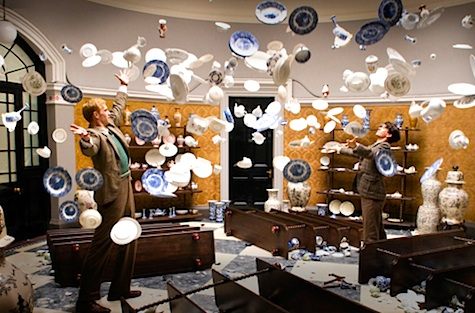The term “poète maudit” was coined in the 19th century to describe a class of poet—among whom were Baudelaire, Rimbaud, and Verlaine—who took drugs, committed criminal acts, and had interesting sex lives. The adjective “maudit,” which means “cursed,” referred to the tendency of these poets to die very young, at no point in their brief lives ever able to functionally connect to society and live the proverbial normal life. The term “maudit,” in reference to both les poètes maudits themselves and to the notion of being cursed in general, has been appropriated by some film critics recently to describe movies that, for whatever reason, are doomed to be misunderstood and overlooked, too strangely beautiful for this world, to never live on as classics of the form. Such a film maudit is Cloud Atlas.
In a way, the movie Cloud Atlas is even more a strange and singular thing than the book from which it’s adapted. David Mitchell’s novel is a gorgeously written, ingeniously constructed piece whose epic scope—six storylines taking place over the space of many hundreds of years—is slightly out of balance with its simple, concise endpoint: “Yet what is any ocean [the totality of human existence] but a multitude of drops [each human life]?” Obviously, there’s more to that oceans/drops metaphor than that, and the idea that human beings should be kind to each other because we’re all ultimately connected is one that more human beings would do well to heed, but ultimately Cloud Atlas is more a very good book than a revolutionary work of literature. The movie, in contrast, is a different beast altogether.
Mainstream film, and even most non-mainstream film, is narrative-based, and to such a narrow degree that there’s one particular dominant narrative mode, one that can be broken down (roughly, at times) into three major acts. So many movies’ stories happen totally sequentially that any departure from that at all is seen as radical, and a movie that departs from that idea as totally as Cloud Atlas does can seem almost entirely incomprehensible at places. Writer-directors Lana Wachowski, Tom Tykwer, and Andy Wachowski make no effort whatsoever to ease that incomprehensibility: they alter the book’s 1-2-3-4-5-6-5-4-3-2-1 structure and chop up the narrative of each storyline with little regard for the events taking place, instead cutting from one to the next based on character beats.
If that sounds a little hard to follow, that’s because it is. The Cloud Atlas that Tykwer and the Wachowskis have made is less a traditional adaptation of the novel than it is an audiovisual essay on a close read of the text interpreting the novel’s theme of interconnectedness through the prism of reincarnation. The central cast of actors in the movie all play multiple roles—at times different races and/or genders—with the aid of elaborate makeup, often in the same role to the other characters as they are in previous incarnations: lovers are lovers more than once, villains are villains repeatedly, and so on. Once that conceit becomes clear, it’s interesting to observe, but there’s a long rocky period before clarity prevails.
This is the great dilemma Cloud Atlas faces. In order to have the slightest idea of what’s going on, one probably needs to have read the book; I was immensely grateful to have done so, in terms of being able to keep track of who was where and when and what was happening why, and how. At the same time, the movie is such a stubbornly idiosyncratic read of the book that even reading it multiple times might not be adequate preparation for some of the stylistic flourishes and even substantive departures. It is simultaneously and paradoxically beholden to its source material and a completely separate entity.
Speaking to Cloud Atlas strictly as cinema, it’s staged beautifully with great attention to detail, with some indelible images, for better and worse. The makeup, being the most noticeable visual effect, is alternately subtly perfect and distractingly horrible (some of the fake noses in the 19th century storyline are unbelievably bad; the controversial casting of Caucasian actors as Asian characters actually oddly works both thematically and practically, not only because Asian actors also play non-Asian characters). The music, as it should be with one whole storyline being about the composition of the “Cloud Atlas sextet,” is wonderful. And the actors, even if what they do doesn’t always work, all do a pretty remarkable job with their various roles, and have one successful one that outweighs the unfortunate misfires.
This is also true of the movie as a whole. Its opening sequence requires a tremendous amount of focus and patience, more than someone in the mood for light entertainment may be willing or able to give. Once that’s past, and the movie hits its stride, and its rhythms make it possible to engage with emotionally as well as literarily, it’s really a remarkable thing indeed. It’s a movie overflowing with ideas and ambition that’s sublime when it works and frankly a little embarrassing when it doesn’t. I kind of love it, but have few illusions that its fate is anything other than to be a film maudit, ardently defended by some and either dismissed or ignored by many. Any ocean, alas, is both a multitude of drops and of bitter salt.
Danny Bowes is a New York City-based film critic and blogger.










